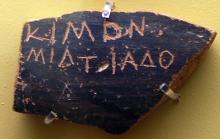Nepos introduces his collection of biographies of famous generals.
Supplementary Essay on the Prologus
(1) nōn dubitō fore plērōsque: indirect statement with a verb of expecting (AG §580c), “I do not doubt that there will be a great many (people).” fore: alternative form of futūrōs esse.
Attice: Nepos’ friend, Titus Pomponius Atticus (ca. 109–ca. 32 BC). The vocative signals that the work is dedicated to him. Atticus was a wealthy and learned man who spent many years living in Greece, thus earning him the agnomen “the man from Athens." From the letters of Cicero, with whom Atticus maintained a lifelong correspondence, we know that Atticus occasionally returned to Rome and was involved in various political negotiations and affairs on Cicero’s behalf. Atticus’ house on the Quirinal hill in Rome often served as a meeting place for writers such as Nepos, Cicero, and the greatest scholar of the age, Marcus Terentius Varro. In addition to an influential epitome of Roman history (Liber annalis), he composed an account in Greek of Cicero’s consulship, letters, and poetry. None of Atticus’ works have survived.
quī…iūdicent: relative clause of characteristic (AG §535); its antecedent is plērōsque.
leve: “unimportant, trivial,” in comparison to more serious genres, such as history.
dīgnum: "worthy of" + ablative (AG §418b).
cum relātum legent: “when they (will) read it related/told.” relātum is the perfect passive participle of referō.
quis mūsicam docuerit Epamīnōndam: indirect question with perfect subjunctive, docuerit (AG §574). An educated Greek man was expected to be able to play the lyre and sing festive, improvised songs known as skolia at dinner parties. Romans thought such behavior beneath the dignity of a freeborn male.
docuerit: doceō takes a double accusative of the person taught (Epamīnōndam) and the subject being taught (mūsicam).
Epamīnōndam: Epaminondas, a Theban general and statesman, was hailed in antiquity as one of the most virtuous and incorruptible of the Greeks. Nepos' biography of Epaminondas, who forever broke Sparta's military power at the Battle of Leuctra (371 BC), survives.
ēius…eum: i.e. Epaminondas.
commemorārī: passive infinitive dependent on relātum legent and introducing two indirect statements that describe the other un-Roman activities performed by Epaminondas, 1) saltāsse eum commodē and 2) scienterque tībiīs cantāsse.
saltā(vi)sse and cantā(vi)sse: syncopated perfects (AG §181).
(2) hī: referring back to the plērōsque in the previous sentence; antecedent of quī, "those who…."
ferē: with words of number or quantity (e.g., plērōsque), "for the most part."
expertēs: in apposition with quī. expers takes the genitive, litterārum Graecārum, “ignorant of Greek culture.” Remember that expers is derived from ex-pars ("to have no part in"); it should not be confused with "expert," derived from expertus > experior ("to try, to have experienced").
nisi quod: "except that which…," introducting a relative clause of characteristic.
mōribus: “ways” or "customs," dative with the compound verb, conveniat.
(3) didicerint: future perfect > discō, introducing an indirect statement.
turpia: “ugly” in the sense of “morally reprehensible.” This is a key word for Nepos in the Prologus.
maiōrum: “of (their own) ancestors.”
nōs… secūtōs [esse]: indirect statement dependent on nōn admīrābuntur. nōs: i.e. Nepos; ancient authors often referred to themselves using plural forms, especially in prose. Although the precise connotation of this common usage is debatable, it does not convey haughtiness or pretension, as the use of English "we" might in a similar circumstance.
in Grāiōrum virtūtibus expōnendīs: “in setting forth the excellences of Greeks.” expōnendīs is gerundive (AG §503). Nepos mentions Greeks because most of the foreigners in his biographies are Greek, but non-Greek foreign generals—Datames, Hamilcar, and Hannibal—are also treated with respect.
eōrum: i.e. Grāiōrum.
(4) enim: introduces an example that explains the generalization in the previous sentence.
Cīmōnī: Cimon, an Athenian general, played an important role in neutralizing Persia’s threat to Greece in the aftermath of the Persian Wars (490–479 BC).
Athēniēnsium summō virō: in apposition with Cīmōnī.
sorōrem germānam: germānam usually indicates a full sibling, but it can refer to a sister with the same father but a different mother. Marrying a full sister was generally considered taboo in Athens, although according to the Hellenistic Jewish philosopher Philo of Alexandria (ca. 20 BC–AD 50) an old law in Athens permitted men to marry their sisters by the same father, while the equivalent law in Sparta permitted men to marry sisters by the same mother, but not vice versa (Philo, On Special Laws 3.4). Following the analogy of seeds and soil in agriculture, most ancient Greeks and Romans subscribed to the theory that the male seed was the active element of reproduction.
quippe: intensifying affirmative particle emphasizing the causal cum clause (AG §549).
cīvēs: “fellow citizens.”
ūterentur: “use” + ablative of means, eōdem… īnstitūtō (AG §410).
nostrīs mōribus: i.e., Roman customs.
nefās: something that is contrary to moral law or the dictates of heaven, “taboo.”
laudī dūcitur adulēscentulīs: “it is considered a (source of) honor for young men.” laudī is a dative of purpose in a double dative construction in which adulēscentulīs is the dative of reference (AG §382).
quam plūrimōs amātōrēs: “as many lovers as possible”; quam + superlative, “as…as possible” (AG §291c). Nepos here refers to relationships between older and younger men.
Lacedaemonī: locative, “in Sparta" (AG §35h).
nūlla vidua est quae: “there is no widow of the sort who…,” introducting a relative clause of characteristic.
†ad cēnam† eat mercēde conducta: the meaning of this phrase is unclear and the text may be corrupt; other manuscripts read ad scaenam ("on stage") and scholars have offered numerous conjectures for what Nepos may have written (e.g., obscena, "lewdness, indecency"). No ancient author supports Nepos' contention that it was honorable for Spartan widows to hire themselves out as courtesans at feasts; nevertheless, since many ancient authors spoke about the moral laxity of Spartan woman, it is not difficult to imagine how such a misconception might arise.
eat: present subjunctive > eō, īre.
mercēde conducta: “hired for a fee”; mercēde is ablative of price (AG §416).
(5) tōtā… Graeciā: ablative of place where. When an adjective is used, the preposition in is often omitted, regularly so with tōtus (AG §429.2); compare in Graeciā (12.3).
victōrem Olympiae citārī: the passive infinitive, citārī, must be the subject of fuit (AG §452), “to be announced as champion at Olympia.”
populō esse spectāculō: “to be a (source of) spectacle for the people,” double dative construction (AG §382).
nēminī fuit turpitūdinī: another double dative.
apud nōs: “among us,” i.e., in Roman as opposed to Greek culture.
pōnuntur: “are considered"; Nepos frequently uses this verb as a synonym of habeor, iūdicō, or exīstimō.
(6) contrā ea: “in opposition to these things,” i.e., “on the other hand”; ea (neuter plural) refers to the previous sentence. This phrase is common in prose writers of the late republic (e.g. Caesar and Livy).
nostrīs mōribus: dative with decōra.
quem: interrogative pronoun, accusative of the person affected by the sentiment of the impersonal verb, pudet, “it is shameful to which of the Romans…?”; i.e., “what Roman feels shame…?”
Rōmānōrum: partitive genitive limiting quem (AG §346).
uxōrem dūcere: “to lead [one’s] wife” (rather than the common idiom, “to marry”).
māter familiās: the female head of a Roman family; familiās is an old form of the first declension genitive (AG §43b). Nepos’ comments about the free movement of Roman women should be taken to apply to upper class women in respectable households. Nepos uses the term māter familiās: the loyal wife of the head of the Roman family, the pater familias. While pater familias was a strictly defined legal term referring to the oldest male in a familia, the Roman jurist Ulpian (AD 170–228) claimed that “character is what distinguishes and separates a mater familias from other women; accordingly it makes no difference whether she is married or a widow, freeborn or freed; for neither marriage nor birth make a mater familias, but good character" (Digest 50.16.46.1). The strong association of the term with the sexual chastity of the respectable Roman matrona explains Nepos’ use of the term in this context. Women of lower socio-economic status would, presumably, have even fewer constraints on their public visibility, although information about their lives is scanty.
prīmum locum: i.e., the atrium. Originally used for domestic industry such as weaving, it became the principle receiving room of the upper-class Roman house.
in celēbritāte versātur: “appears in public.”
(7) quod: a connective relative that associates the sentence with part or all of the preceding thought (AG §308f).
multō: “by a lot,” “much” (modifying aliter); ablative of degree of difference (AG §414).
nisi propinquōrum: “except among relations.”
quō: “(to) where,” adverb modifying accēdit.
(8) hīc: adverbial, "at this point."
plūra persequī: “recounting more instances,” an object clause (AG §452) explaining what the scope of the book (magnitūdō volūminis) and Nepos' eagerness (festīnātiō) prevent (prohibet).
cum…tum: “both…and....”
magnitūdō volūminis: could refer just to the book of biographies of foreign generals, or to the entire corpus of sixteen books, which contained over 400 biographies.
festīnātiō ut ea explicem, quae exōrsus sum: “my haste to explain those things (ea) which (quae)…”; ut introduces a purpose clause triggered by fēstinātiō, a noun that contains the notion of action.
ad prōpositum: “to the point” (of the task).
veniēmus…expōnēmus: note the future tense.


